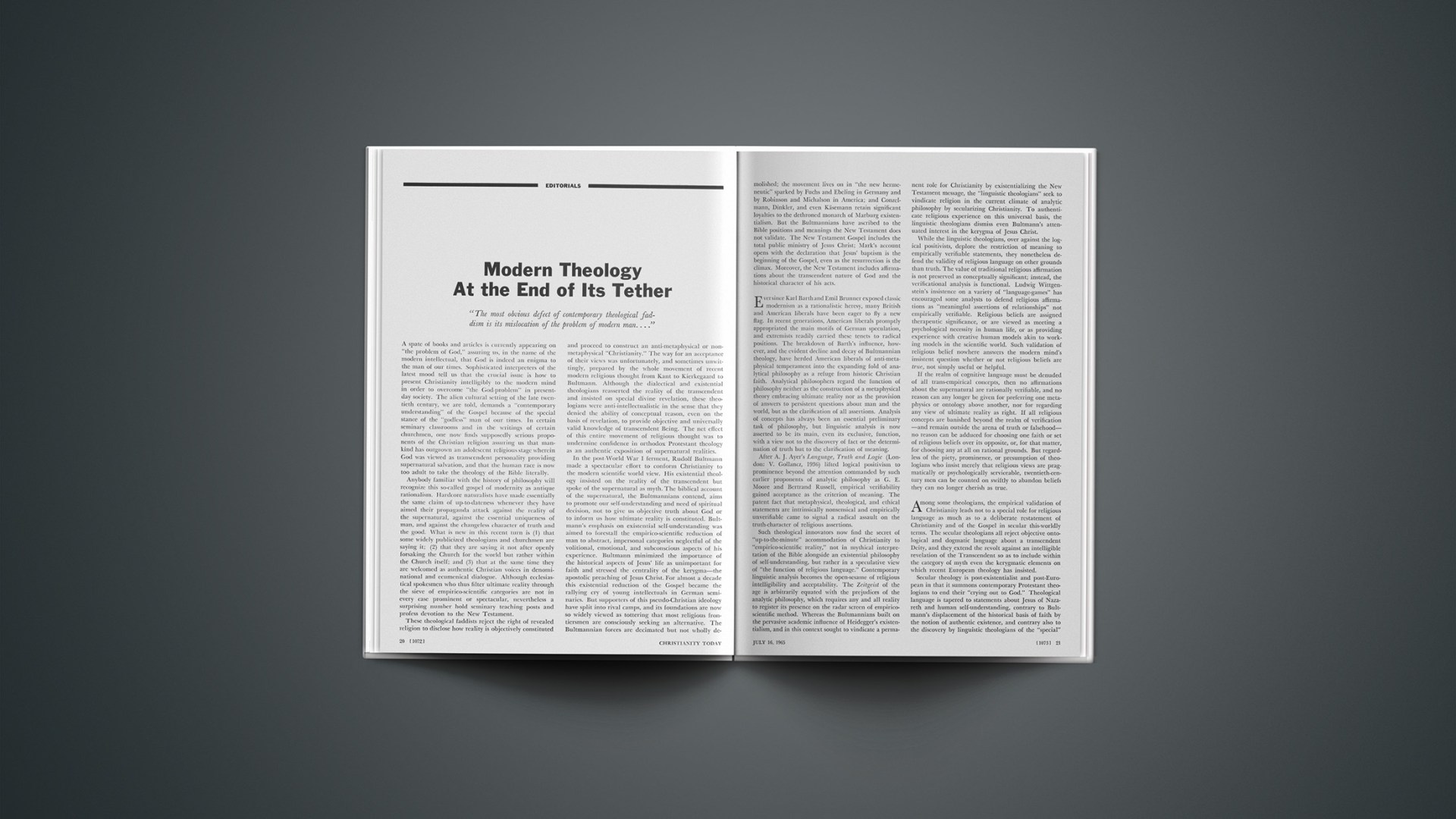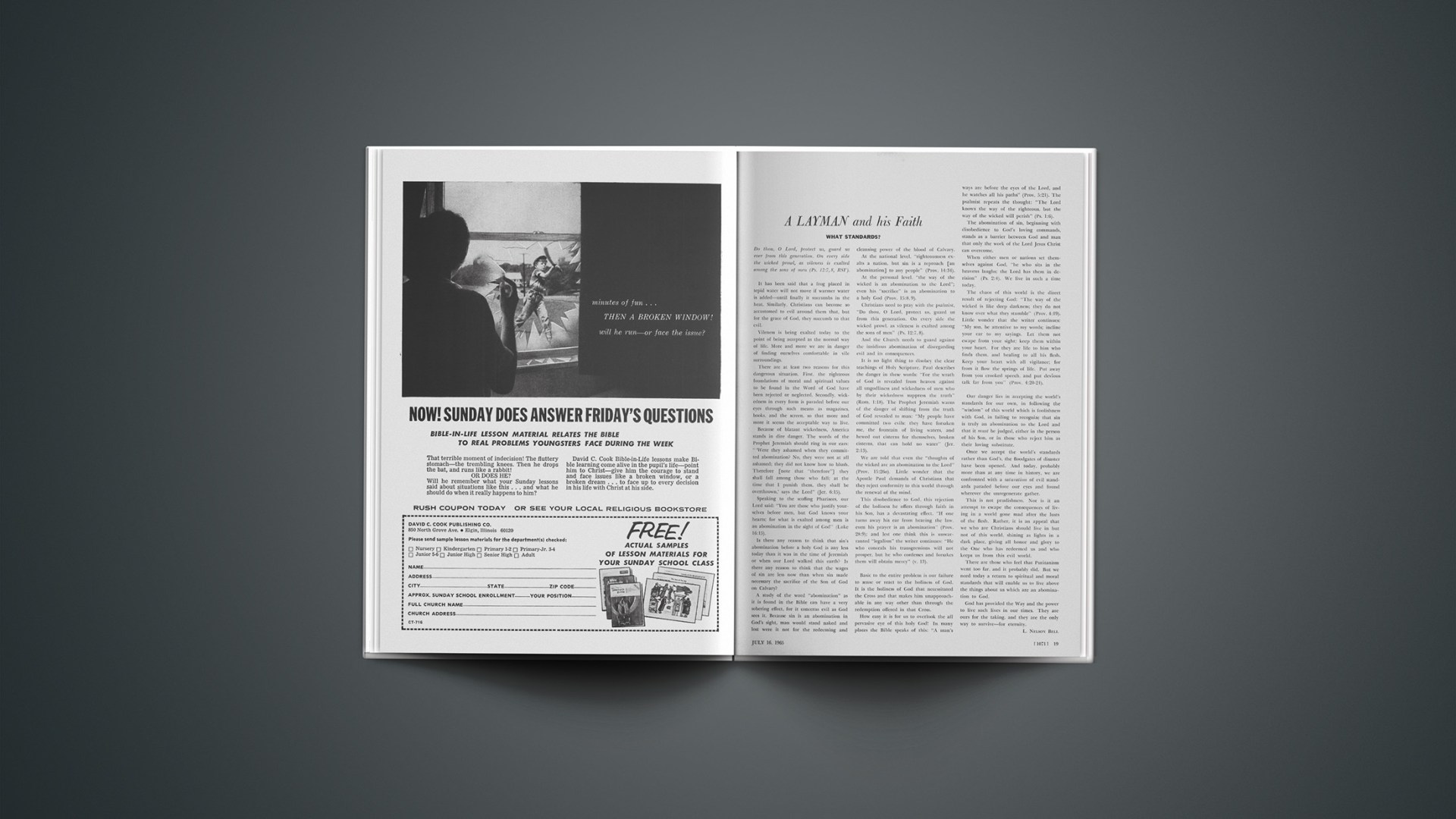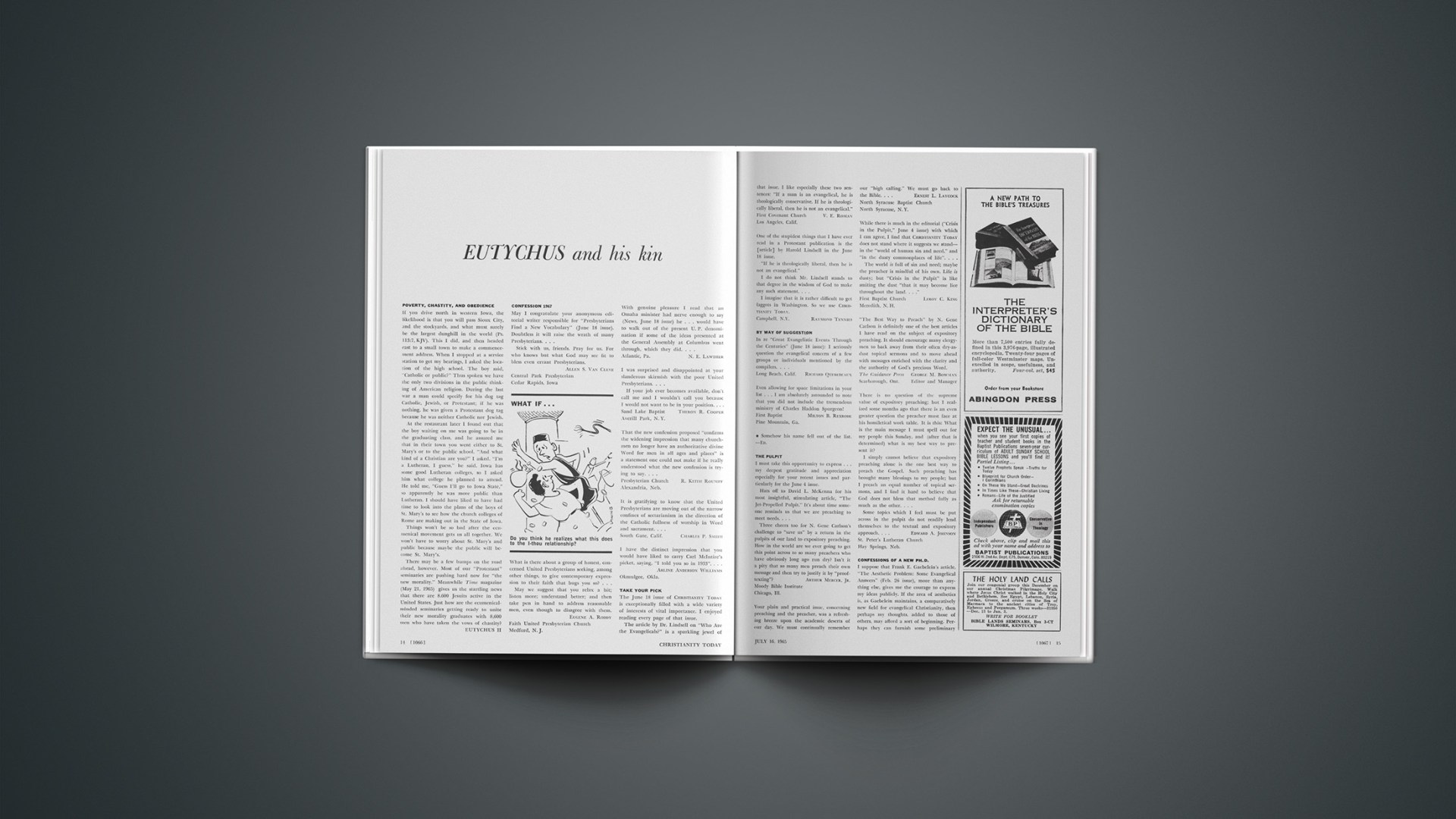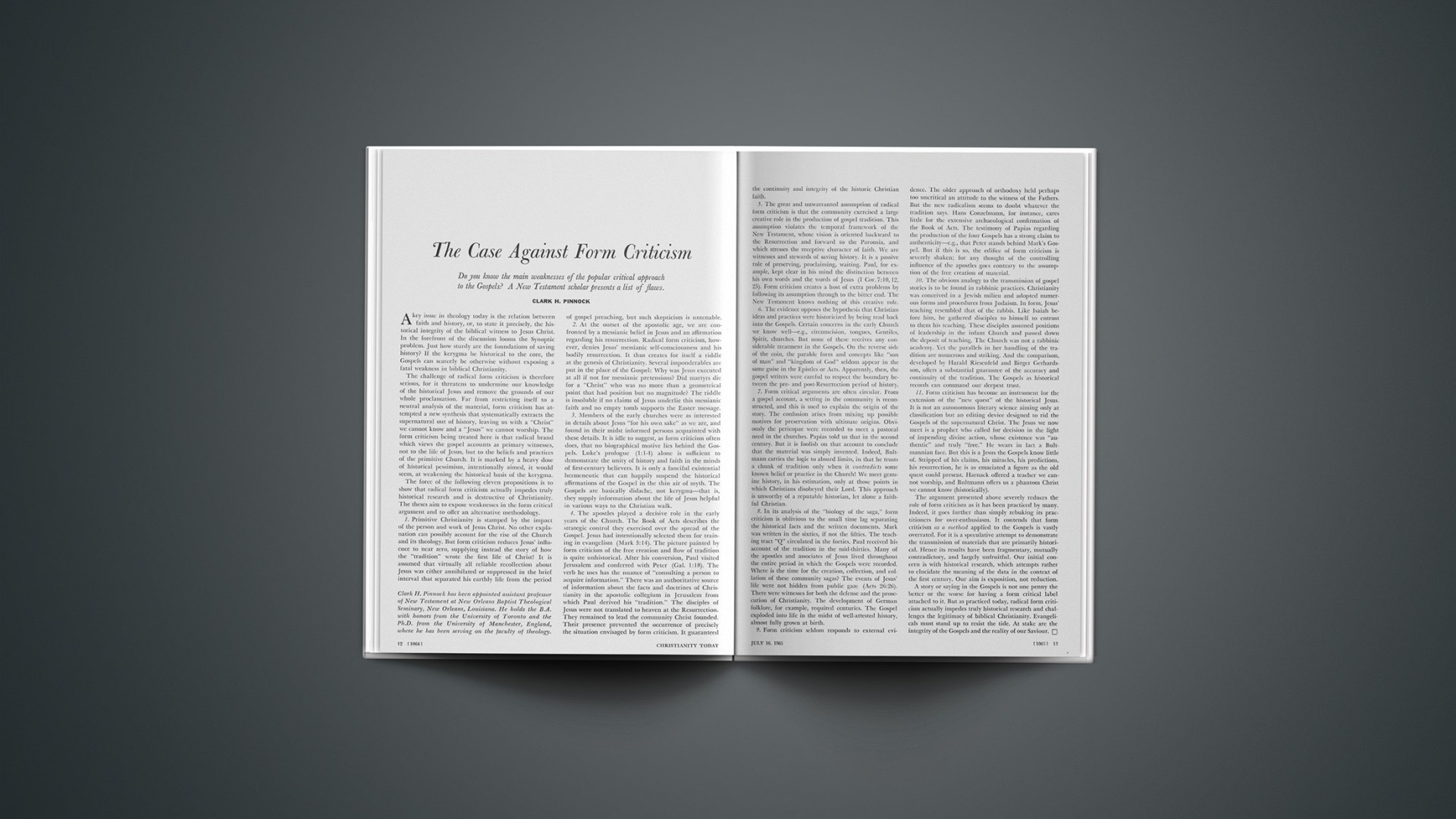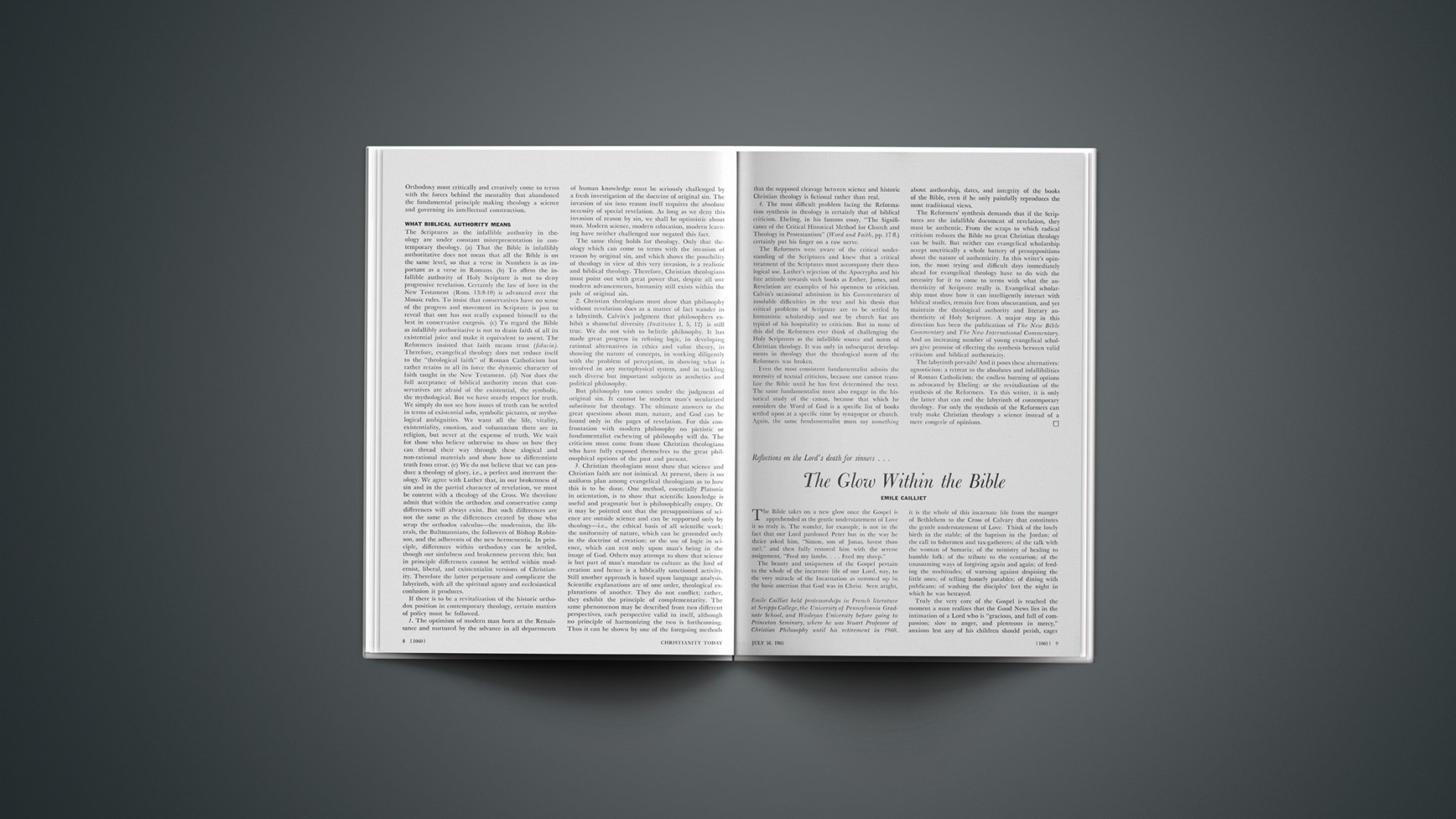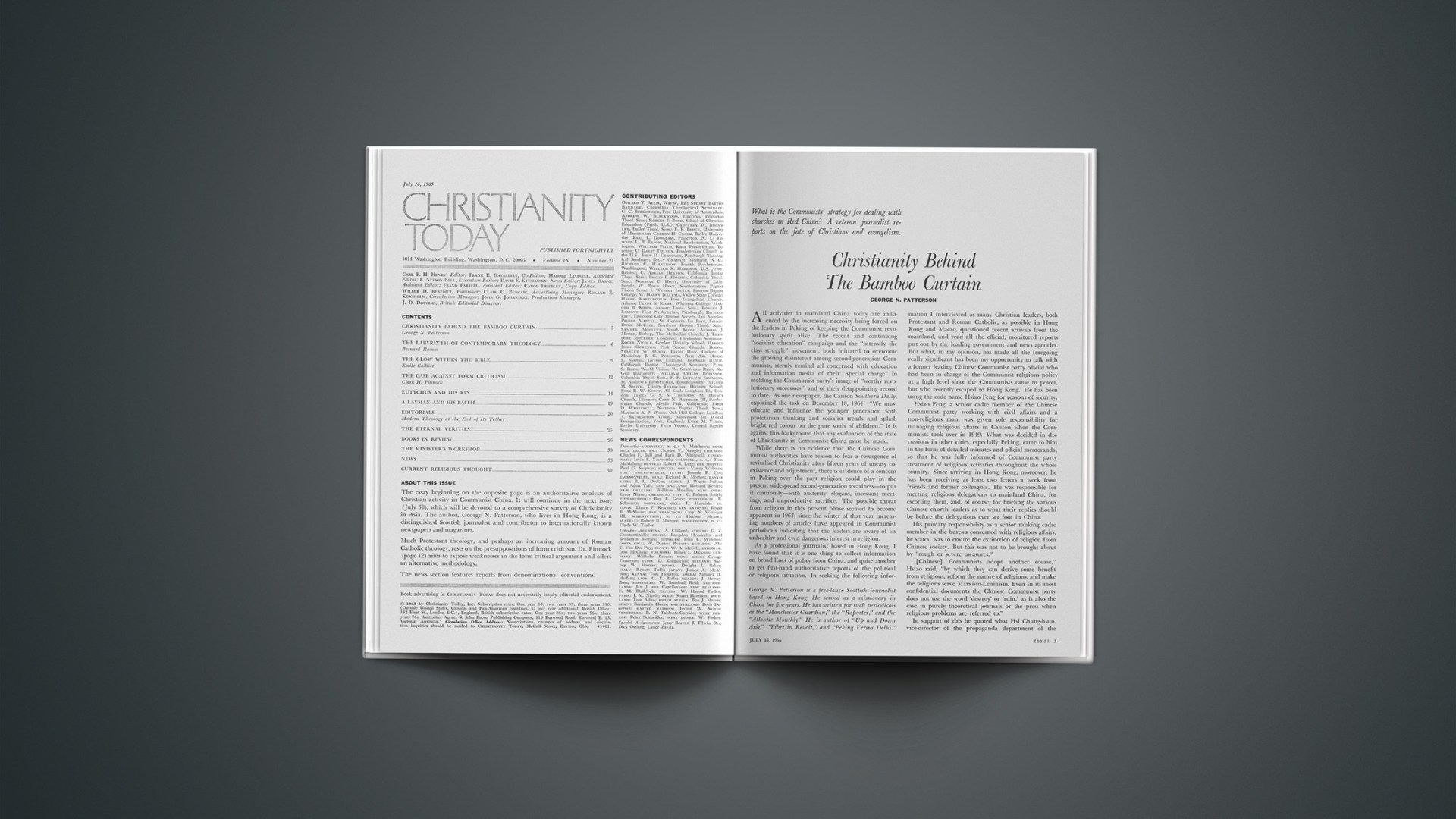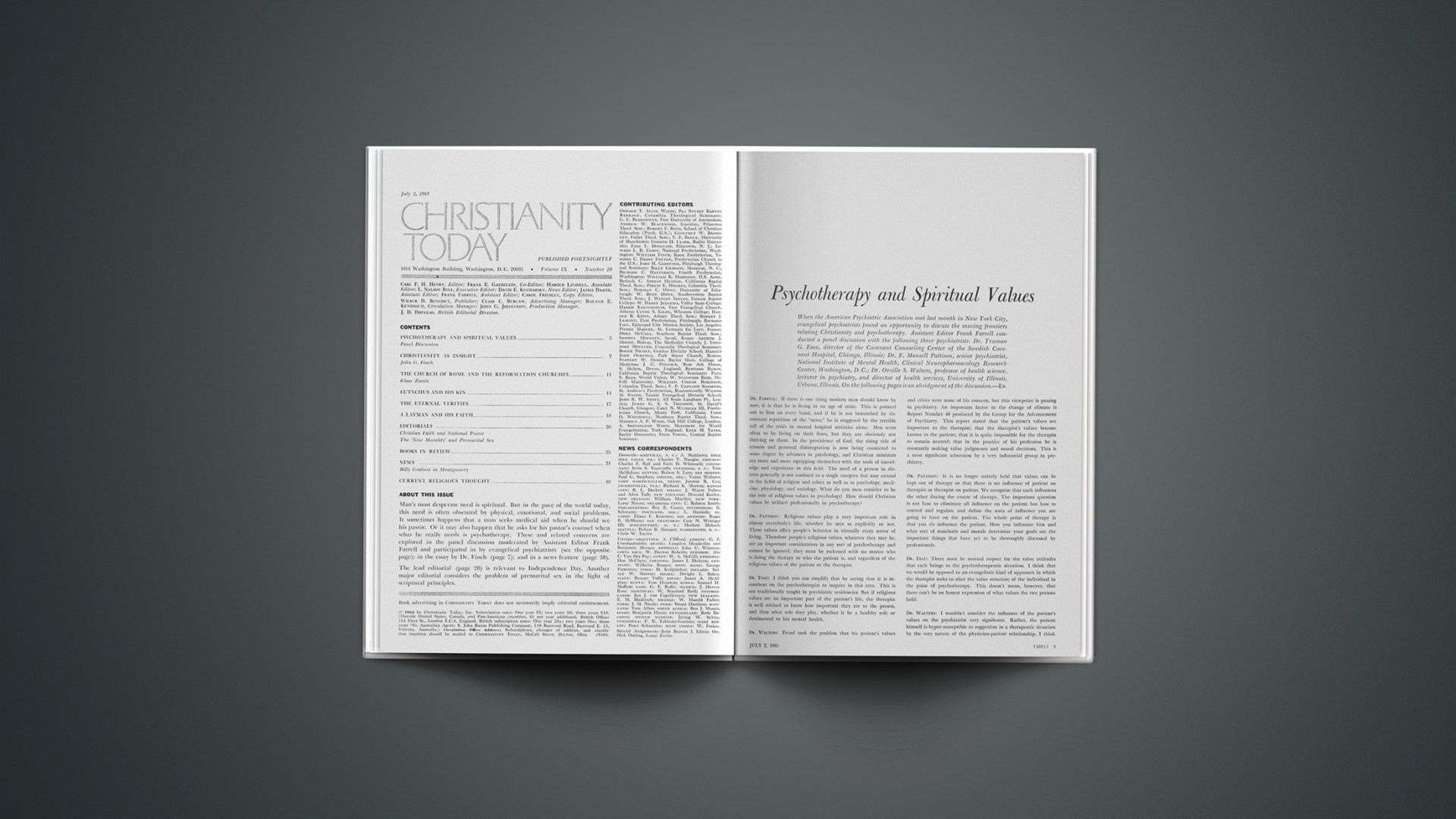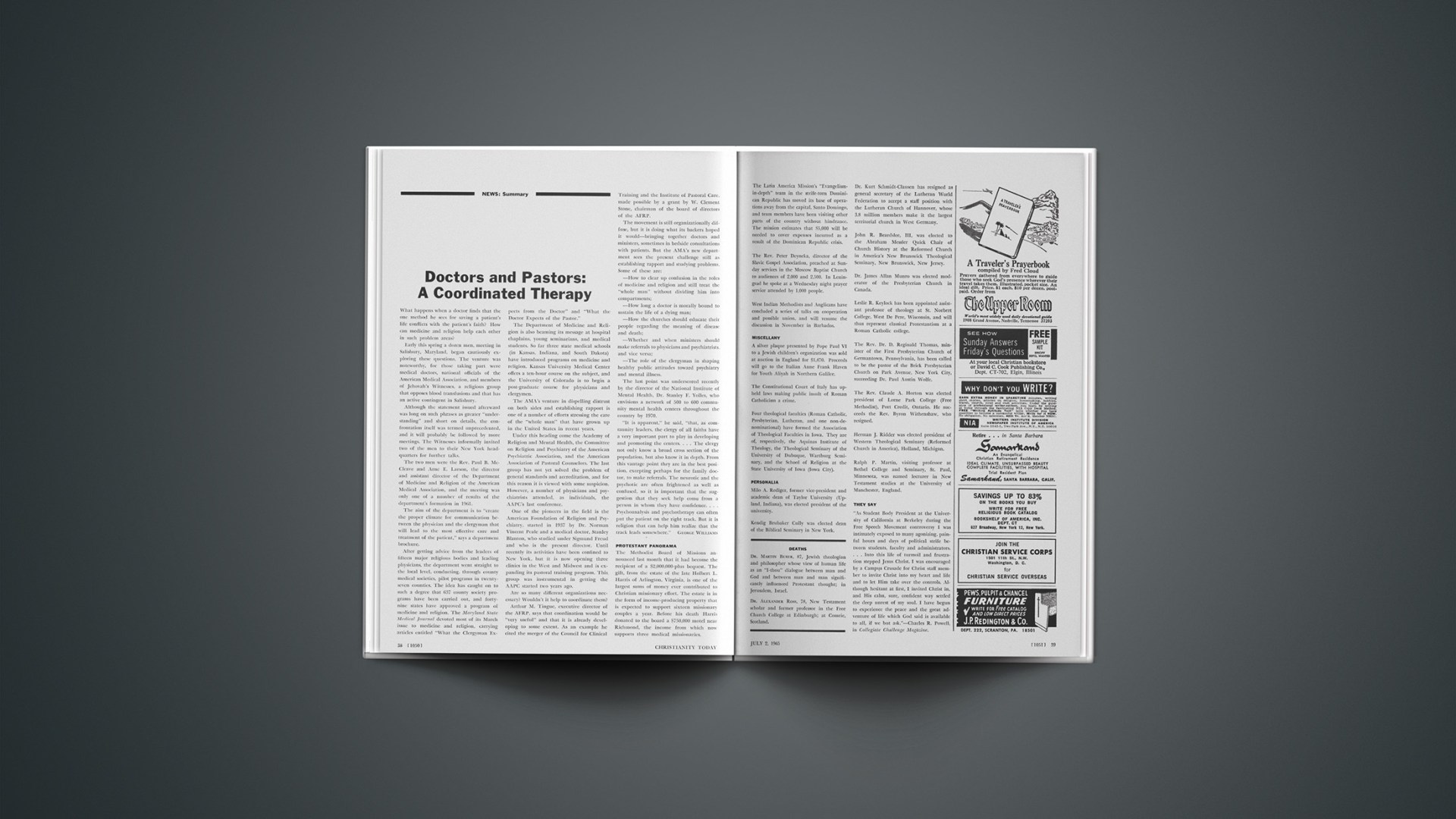“The most obvious defect of contemporary theological faddism is its mislocation of the problem of modern man.…”
A spate of books and articles is currently appearing on “the problem of God,” assuring us, in the name of the modern intellectual, that God is indeed an enigma to the man of our times. Sophisticated interpreters of the latest mood tell us that the crucial issue is how to present Christianity intelligibly to the modern mind in order to overcome “the God-problem” in present-day society. The alien cultural setting of the late twentieth century, we are told, demands a “contemporary understanding” of the Gospel because of the special stance of the “godless” man of our times. In certain seminary classrooms and in the writings of certain churchmen, one now finds supposedly serious proponents of the Christian religion assuring us that mankind has outgrown an adolescent religious stage wherein God was viewed as transcendent personality providing supernatural salvation, and that the human race is now too adult to take the theology of the Bible literally.
Anybody familiar with the history of philosophy will recognize this so-called gospel of modernity as antique rationalism. Hardcore naturalists have made essentially the same claim of up-to-dateness whenever they have aimed their propaganda attack against the reality of the supernatural, against the essential uniqueness of man, and against the changeless character of truth and the good. What is new in this recent turn is (1) that some widely publicized theologians and churchmen are saying it; (2) that they are saying it not after openly forsaking the Church for the world but rather within the Church itself; and (3) that at the same time they are welcomed as authentic Christian voices in denominational and ecumenical dialogue. Although ecclesiastical spokesmen who thus filter ultimate reality through the sieve of empirico-scicntific categories are not in every case prominent or spectacular, nevertheless a surprising number hold seminary teaching posts and profess devotion to the New Testament.
These theological faddists reject the right of revealed religion to disclose how reality is objectively constituted and proceed to construct an anti-metaphysical or non-metaphysical “Christianity.” The way for an acceptance of their views was unfortunately, and sometimes unwittingly, prepared by the whole movement of recent modern religious thought from Kant to Kierkegaard to Bultmann. Although the dialectical and existential theologians reasserted the reality of the transcendent and insisted on special divine revelation, these theologians were anti-intellectualistic in the sense that they denied the ability of conceptual reason, even on the basis of revelation, to provide objective and universally valid knowledge of transcendent Being. The net effect of this entire movement of religious thought was to undermine confidence in orthodox Protestant theology as an authentic exposition of supernatural realities.
In the post-World War I ferment, Rudolf Bultmann made a spectacular effort to conform Christianity to the modern scientific world view. His existential theology insisted on the reality of the transcendent but spoke of the supernatural as myth. The biblical account of the supernatural, the Bultmannians contend, aims to promote our self-understanding and need of spiritual decision, not to give us objective truth about God or to inform us how ultimate reality is constituted. Bultmann’s emphasis on existential self-understanding was aimed to forestall the empirico-scientific reduction of man to abstract, impersonal categories neglectful of the volitional, emotional, and subconscious aspects of his experience. Bultmann minimized the importance of the historical aspects of Jesus’ life as unimportant for faith and stressed the centrality of the kerygma—the apostolic preaching of Jesus Christ. For almost a decade this existential reduction of the Gospel became the rallying cry of young intellectuals in German seminaries. But supporters of this pseudo-Christian ideology have split into rival camps, and its foundations are now so widely viewed as tottering that most religious frontiersmen are consciously seeking an alternative. The Bultmannian forces are decimated but not wholly demolished; the movement lives on in “the new hermeneutic” sparked by Fuchs and Ebeling in Germany and by Robinson and Michalson in America; and Conzelmann, Dinkler, and even Käsemann retain significant loyalties to the dethroned monarch of Marburg existentialism. But the Bultmannians have ascribed to the Bible positions and meanings the New Testament does not validate. The New Testament Gospel includes the total public ministry of Jesus Christ; Mark’s account opens with the declaration that Jesus’ baptism is the beginning of the Gospel, even as the resurrection is the climax. Moreover, the New Testament includes affirmations about the transcendent nature of God and the historical character of his acts.
Ever since Karl Barth and Emil Brunner exposed classic modernism as a rationalistic heresy, many British and American liberals have been eager to fly a new flag. In recent generations, American liberals promptly appropriated the main motifs of German speculation, and extremists readily carried these tenets to radical positions. The breakdown of Barth’s influence, however, and the evident decline and decay of Bultmannian theology, have herded American liberals of anti-metaphysical temperament into the expanding fold of analytical philosophy as a refuge from historic Christian faith. Analytical philosophers regard the function of philosophy neither as the construction of a metaphysical theory embracing ultimate reality nor as the provision of answers to persistent questions about man and the world, but as the clarification of all assertions. Analysis of concepts has always been an essential preliminary task of philosophy, but linguistic analysis is now asserted to be its main, even its exclusive, function, with a view not to the discovery of fact or the determination of truth but to the clarification of meaning.
After A. J. Ayer’s Language, Truth and Logic (London: V. Gollancz, 1936) lifted logical positivism to prominence beyond the attention commanded by such earlier proponents of analytic philosophy as G. E. Moore and Bertrand Russell, empirical verifiability gained acceptance as the criterion of meaning. The patent fact that metaphysical, theological, and ethical statements are intrinsically nonsensical and empirically unverifiable came to signal a radical assault on the truth-character of religious assertions.
Such theological innovators now find the secret of “up-to-the-minute” accommodation of Christianity to “empirico-scientific reality,” not in mythical interpretation of the Bible alongside an existential philosophy of self-understanding, but rather in a speculative view of “the function of religious language.” Contemporary linguistic analysis becomes the open-sesame of religious intelligibility and acceptability. The Zeitgeist of the age is arbitrarily equated with the prejudices of the analytic philosophy, which requires any and all reality to register its presence on the radar screen of empirico-scientific method. Whereas the Bultmannians built on the pervasive academic influence of Heidegger’s existentialism, and in this context sought to vindicate a permanent role for Christianity by existentializing the New Testament message, the “linguistic theologians” seek to vindicate religion in the current climate of analytic philosophy by secularizing Christianity. To authenticate religious experience on this universal basis, the linguistic theologians dismiss even Bultmann’s attenuated interest in the kerygma of Jesus Christ.
While the linguistic theologians, over against the logical positivists, deplore the restriction of meaning to empirically verifiable statements, they nonetheless defend the validity of religious language on other grounds than truth. The value of traditional religious affirmation is not preserved as conceptually significant; instead, the verificational analysis is functional. Ludwig Wittgenstein’s insistence on a variety of “language-games” has encouraged some analysts to defend religious affirmations as “meaningful assertions of relationships” not empirically verifiable. Religious beliefs are assigned therapeutic significance, or are viewed as meeting a psychological necessity in human life, or as providing experience with creative human models akin to working models in the scientific world. Such validation of religious belief nowhere answers the modern mind’s insistent question whether or not religious beliefs are true, not simply useful or helpful.
If the realm of cognitive language must be denuded of all trans-empirical concepts, then no affirmations about the supernatural are rationally verifiable, and no reason can any longer be given for preferring one metaphysics or ontology above another, nor for regarding any view of ultimate reality as right. If all religious concepts are banished beyond the realm of verification—and remain outside the arena of truth or falsehood—no reason can be adduced for choosing one faith or set of religious beliefs over its opposite, or, for that matter, for choosing any at all on rational grounds. But regardless of the piety, prominence, or presumption of theologians who insist merely that religious views are pragmatically or psychologically serviceable, twentieth-century men can be counted on swiftly to abandon beliefs they can no longer cherish as true.
Among some theologians, the empirical validation of Christianity leads not to a special role for religious language as much as to a deliberate restatement of Christianity and of the Gospel in secular this-worldly terms. The secular theologians all reject objective ontological and dogmatic language about a transcendent Deity, and they extend the revolt against an intelligible revelation of the Transcendent so as to include within the category of myth even the kerygmatic elements on which recent European theology has insisted.
Secular theology is post-existentialist and post-European in that it summons contemporary Protestant theologians to end their “crying out to God.” Theological language is tapered to statements about Jesus of Nazareth and human self-understanding, contrary to Bultmann’s displacement of the historical basis of faith by the notion of authentic existence, and contrary also to the discovery by linguistic theologians of the “special” significance of universal religious affirmations. These secular theologians are not concerned simply because supersensible realities are without effective force in modern life; they boldly aim to make religion relevant by erasing its supernatural aspects entirely. If the dialectical and existential theologies turned aside from “objectified theism” and viewed existence as an inappropriate term when speaking of God, the secular theologians now reject “non-objectified theism” as well. From the objective-transcendent personal God of Judeo-Christian theology, therefore, neo-Protestant interpreters have moved in recent generations to the nonobjective-transcendent personal God (Barth and Brunner), to the nonobjective-transcendent impersonal Unconditioned (Tillich), to the nonobjective-mythological-transcendent personal God (Bultmann), to nonobjective-nontranscendent religion. Thomas J. J. Altizer views “the death of God” as a “historical event” datable in our own lifetime, and offers his religious speculations as an example of relevant theologizing in the time of “the death of God.” Paul M. van Buren obligingly informs us that “the word ‘God’ is dead” (The Secular Meaning of the Gospel, Macmillan, 1963, p. 103); what remains is the man Jesus—his life and death and availability for others, his values, and the contagion of his perspective, urging us to freedom from self-concern and to self-surrender for others. But skillful critics observe that, on the one hand, Van Buren’s “secularized Christianity” perverts the essence of New Testament Christianity no less than does Bultmann’s existentialism, and that, on the other hand, by championing the ethical centrality of Jesus as one who calls us to serve in the world, “secularized Christianity” espouses a selection of values fully as unintelligible and offensive to the modern empirico-scientific outlook as the traditional concepts Van Buren proposes to replace.
On the assumption that modern knowledge renders unintelligible the scriptural formulation of the Gospel, the secular theologians eliminate the invisible, transcendent, absolute God of the Bible. Christianity must, we are told, dispense wholly with “God-talk” in order to become relevant, appropriate, and intelligible to the man of the late 1960s. All references to the supernatural God, to supernatural relationships, even to dependence on the supernatural, are spurned; and in consequence of this distrust of the suprahistorical and supernatural, the transempirical is translated into the empirical. The metaphysical and cosmological aspects of revealed religion are thereby eliminated and the relevant subject matter of theology reduced to the historical, human, and ethical.
If this maneuver were ventured frankly as an open and avowed repudiation of revealed religion, confusion would be lessened and truth and fact advanced, since God and Christ and redemption and the Church lose their biblical actuality in these contemporary fabrications. But Bishop J. A. T. Robinson promulgates his Honest to God as an authentic revised version of biblical Christianity, while Van Buren seeks to assure us that his secularized Christianity omits “nothing essential” to Christian faith. Yet these and similar efforts—among them William Hamilton’s The New Essence of Christianity (Association Press, 1961) and Altizer’s Mircea Eliade and the Dialectic of the Sacred (Westminster, 1963)—not only violate the essential spirit and substance of historic Christianity but radically alter the role of religion in human life.
The most obvious defect of this contemporary theological faddism is its mislocation of the problem of modern man. Whether modern man’s special difficulty is specified as the use of religious language in a secular age, or as self-understanding, or as the supposed requirements of a scientific outlook, it is always falsely implied that no view of Christianity is possible for modern man other than one screened through empirical categories. But in fact the transcendent, supernatural God disclosed in the Judeo-Christian revelation in no way competes with what the modern man knows. The modern problem is not the transcendent God but rebellious man—not modern man in some peculiar way but man as fallen. Even in our time we are not dealing with a man who is wholly “godless,” although we are dealing assuredly with a man who is ungodly, with a creature in the grip of sin and death for whom sin and death are such inescapable concerns that he resorts to the most ingenious devices—existential, linguistic, and secularistic—to becloud their existence. Because theological renegades ask the wrong question—How transform Christianity to enlist the secular man?—they come up with the perverse answer: Restructure the Gospel! rather than Regenerate the sinner! Instead of proclaiming God’s revelation and demanding man’s reconstruction, they enthrone secular empiricism and reconstitute the Christian religion.
The secular modern man fashions ingenious intellectual shelters to shield himself from divine confrontation and to hide himself from divine scrutiny and exposure. Much of the popular reading of our day, as well as some technical literature, mirrors man’s spiritual evasion and equivocation, his moral ambiguity, his selfcompromise in the face of ultimate concerns. The theological faddists provide a tidy formula capable of easy memorization and useful as a “shocker” by modern Athenians ever on the prowl for something new, always suspicious of a faith “once for all delivered to the saints,” and therefore incapable of finding an intellectual resting-place. In hushed tones they impart the latest secret of the cosmos: “Christian faith is gone; Christian hope is gone; all that is left is Christian love—but that’s enough.”
To a generation dangling over the abyss of despair, any rope, however slim, is welcome. If agape can bear the burden of late twentieth-century doubt and anxiety, then agape is perhaps worth a try. If the supernatural and transcendent must go, if the historical is all that is left, especially the example of Jesus, perhaps that will patch up our raveling existence, even if this “agape” at times overtly justifies what the divine commandments and Jesus of Nazareth disapprove. It is not the inner logic of this proposal, nor any sound reason for such a hope, but the dire futility and emptiness of modern life that shapes a bare interest in this possibility—and, for that matter, in a hundred and one other contemporary cults. The linguistic theologians never tell us why human life ought to hold together; nor why Jesus alone holds it together; nor that this religious belief is objectively true; nor why it is logically superior to a contrary view. Nor can they.
A tired band of religious hopefuls, vulnerable victims of the biases of modernity, may rally momentarily to this expedient to justify their specialization in religion or their interest in the Church. But few college students are won to Christian faith by the modern proposals, which elevate the dated prejudices of the modern mind into status symbols and conform even the revelation of God and the Gospel of Christ to them. The man in the street and the layman in the pew shun such appeals because men desire truth no less than emotional satisfaction and cultural acceptance. None of the non-metaphysical theologies from Barth to Bultmann to Tillich to Robinson has nourished any great revival of lay interest in the Christian religion.
Back in the early 1950s Homrighausen noted that despite its emphasis on dynamic relevancy, the entire “Word of God” movement in contemporary theology has failed to produce a single evangelist. How irrelevant to the Great Commission can theologians get? Where do modern men—and there are multitudes of them—flock around Bultmann or Tillich or the linguistic theologians or the “death of God” theologians, crying out: “You have restored authentic Christianity to us!” The captive theological students in ecumenically minded seminaries are their main “converts”—Tillich made Tillichians at Harvard, Hamilton makes Hamiltonians at Colgate Rochester, Van Buren makes Van Burenites at Duke, Altizer makes Altizerites at Emory, and Loomer will be making Loomerites at Berkeley Baptist. But modern men hungry for spiritual reality will not be flocking there. They will fill up the Los Angeles Coliseum, or Madison Square Garden, and the other huge modern arenas to hear Billy Graham preach the New Testament evangel—and they give Graham a hearing in Europe and Africa no less than in North America and Latin America. Those who are always revising the Gospel to protect its power to persuade modern men seem curiously to leave the hardcore secularists as unpersuaded as ever, and to prepare the way for another reconstruction of their own theology a few years hence.
The great modern tragedy is not the problem of the man in the street. It is the spectacle of the theologian who assures him that he can repudiate supernaturalism, and that he must do so, to become a Christian. This sad development means not “the death of God” but the death of Protestant theology, however ecumenically respectable it may be.
A decade ago Frederick Copleston warned of the emergence of a skeptical type of mind that spontaneously regards theology and metaphysics as “dreams and moonshine” and that is “ ‘naturally’ closed to the Transcendent” (Contemporary Philosophy, London: Burns, Oates and Washbourne, 1956, p. 32). Today that skepticism has overtaken an ecclesiastically entrenched vanguard of pseudo-theologians disposed to restrict valid knowledge to the world of nature and to man as described by the sciences. Whatever criticism empirical scientism offers of the Christian religion and of the Bible, these pseudo-theologians accept; they no longer know what it is to contemplate the higher criticism of the prevailing philosophy of science. But it is precisely the contemporary theological reluctance to probe the possibility of attaining knowledge of transcendent reality and the significance of cognitive reasoning in religious experience that is the crucial neglected theological issue of our century.
While theologians dismiss cognitive knowledge of God, they remain intellectually powerless to compete with the sensate-empirical outlook of the modern age—whether they appeal to faith, to experience, to intuition, or to dialectical or existential varieties of “revelation.” Alasdair MacIntyre considers Tillich and Bultmann atheists, because these guiding theologians of Robinson’s Honest to God reject a literal objectifiable theism (“God and the Theologians,” in Encounter, September, 1963). Yet MacIntyre himself, bypassing the “death of God” stop on the expressway from theism to atheism, goes to the end of the line. Karl Barth was surely right in saying that the distance was not great from the domain of Tillich and Bultmann to that of Feuerbach, but he was profoundly wrong in thinking that the mansions of dialectical theology were securely located in the suburbs of supernatural theism.
If Christianity is to win intellectual respectability in the modern world, the reality of the transcendent God must indeed be proclaimed by the theologians—and proclaimed on the basis of man’s rational competence to know the transempirical realm. Apart from recognition of the rational Creator of men made in his image and of the self-revealed Redeemer of a fallen humanity, who vouchsafes valid knowledge of the transempirical world, the modern Athenians are left to munch the husks of the religious vagabonds.
The Ymca—Tokens Of Spiritual Renewal
Several months ago the Second Annual Conference on Christian Witness in the YMCA convened in Washington, D. C. The results suggest that God’s Spirit may be moving some YMCA leaders in a new way so that the organization will again become a vital Christian force.
The speakers at the conference generally agreed that authentic Christian influence is threefold:
1. A person, or persons, having a real, intimate relationship with Jesus Christ;
2. their exhibition of benevolent, Christian influence in whatever social situations engage them;
3. their continued openness to the will of God through the Scriptures, prayer, worship, other people, and circumstances [United States Prayer Communique, April, 1965].
Summarizing the address of one conference speaker, Dr. Paul Limbert, who is executive secretary of Blue Ridge Assembly (a YMCA conference center), the Communique says there must be in the YMCA “a nucleus of professional secretaries and laymen who are committed, on a personal basis, to Jesus Christ and His ability to change men’s hearts.”
It is encouraging to know that YMCA prayer groups are springing up in many places. Some local groups are initiating prayer breakfasts similar to those of International Christian Leadership, which has fostered the Presidential Prayer Breakfast in Washington, D. C., and Governors’ and Mayors’ Breakfasts throughout the nation.
We applaud this evidence of a return to the spiritual emphasis in the YMCA. Some three million men and boys in the United States alone are “Y” members. Founded by George Williams in 1844, the YMCA has for its triangular thrust the body, mind, and spirit. A resurgence of spiritual vitality will reflect the intentions of the founder, prosper the work of the organization, and help more men and boys.
Christians everywhere should support YMCA secretaries who have a burden to bring Christ into the center of their work. At a time when the secular tide is so strong in American life, these tokens of spiritual renewal in the YMCA are cause for thanksgiving.
Science And Ultimate Concerns
“There is a misconception,” writes Dr. Vannevar Bush in the May issue of Fortune, “that scientists can establish a complete set of facts and relations about the universe, all neatly proved, and that on this firm basis men can securely establish their personal philosophy, their personal religion, free from doubt or error.” Dr. Bush thinks the time is overdue to take note of the limitations of science, as well as of its power.
Dr. Bush, who is honorary board chairman of Massachusetts Institute of Technology, proposes some noteworthy reminders at a moment when there is “little doubt” that man soon will create life. “Some very simple short-chain nucleic acid, synthesized from inert matter and placed in a chemical soup, will suddenly assemble accurate images of itself,” he writes in Fortune, “and the job will be done.”
But, Dr. Bush adds, the enigma of man’s self-consciousness and free will remains to confound those who believe that all life has evolved over the eons by simple materialistic processes. “There is cause for much concern,” he remarks, “over those who follow science blindly.” He reminds us that science never proves anything absolutely, that it is preoccupied with what is useful or works, and that on the most vital questions it does not even produce evidence. “On the essential and central core of faith, science must of necessity be silent. But its silence will be the silence of humility, not the silence of disdain.… Young men, who will formulate the deep thought of the next generation, should lean on science, for it can teach much and it can inspire. But they should not lean where it does not apply.”
Which Dowey?
At the 1965 United Presbyterian General Assembly at Columbus, Ohio, Professor Edward A. Dowey of Princeton Theological Seminary carried the burden of explaining and defending the Confession of 1967, the proposed new confession of faith. In reply to searching questions about defects of the new confession, he stated that it approximated Calvin’s views more than the Westminster Confession by virtue of its having been organized around the doctrine of revelation, not inspiration. “But,” he added, “we still have the Westminster doctrine of inspiration, and it will not be held against anyone for holding it.”
It is true that the new confession has nothing significant to say about the inspiration of Scripture, but it is hardly true that because of this it is closer to Calvin. Even a casual reading of Calvin’s Institutes will show that Chapter VIII of Book I is devoted to the defense of the inspiration and the authority of the Bible. Calvin says that Scripture can be “completely vindicated against the subleties of calumniators.” So seriously did he regard the integrity of Scripture that he carefully defended the notion that Daniel wrote prophetically, about events that occurred later, a notion quite acceptable to conservative theologians but distasteful to liberals.
Even more significant, however, is what Professor Dowey himself wrote before the new confession came into view. It is difficult to reconcile this proto-Dowey with the deutero-Dowey of the new confession, especially when we note earlier assertions made in The Knowledge of God in Calvin’s Theology (Columbia University Press, 1952) about Calvin’s view of inspiration:
“When he [Calvin] does admit an undeniable error of grammar or of fact, without exception he attributes it to copyists, never to the inspired writer. There is no hint anywhere in Calvin’s writings that the original text contained any flaws at all” (p. 100).
“Here we find Calvin the theologian and Calvin the humanist scholar side by side, co-operating, but unreconciled in principle. When he writes as a theologian about the inspiration [our italics] … of Scripture, there is not the least hint that Calvin the scholar has found or ever may find an error in the text before him” (p. 103).
“To Calvin the theologian an error in Scripture is unthinkable. Hence the endless harmonizing, the explaining and interpreting of passages that seem to contradict or to be inaccurate” (p. 104).
“If he betrays his position at all, it is in apparently assuming a priori that no errors can be allowed to reflect upon the inerrancy of the original documents” (p. 105).
It is apparent not only that Calvin placed much stock in the doctrine of inspiration as well as revelation, but also that he considered inspiration and the witness of the Holy Spirit to be strong supports for the doctrine of revelation. Why not take Calvin seriously with respect to both revelation and inspiration or spare his memory the injustice of a misleading appeal?

